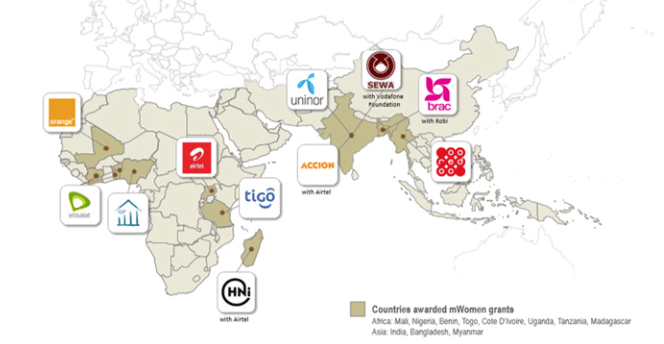To follow up on last month’s diversity in the telecommunications industry article, it’s time for the third and final article in this series, which will highlight the innovation grant program GSMA is running in order to help women advance in the world of connectivity.
The Connected Women Programme has awarded 11 innovation grants to operators and non-governmental organizations in Africa and Asia. The goal of the grants is to provide seed funding for the design and launch of economically sustainable products and services to increase access to mobile phones and value-added services for women. The programs also tout the importance of education and to how technology can impact lives.
Although the grants were initially awarded two years ago, it takes time for the programs to begin and produce results. As expected, programs in different regions are at different levels of results. Below is a quick look at the programs in the two regions:
Africa
- Airtel Uganda: In partnership with the Grameen Foundation, Airtel Uganda developed a mobile solution for women’s savings groups using the Airtel Money platform. The program was launched in the fall of 2014 to offer group wallets, mobile banking and mobile account management with “mini” banking statements via mobile devices.
- Tigo Tanzania: Awarded a grant to identify products and services designed to enable them to better serve resource-poor women throughout Tanzania. Tigo is designing a value-added service that provides business training to these women via text message and IVR to under-served women. A case study published by the GSMA earlier this year detailed the progress that has been made to date on this program.
- Orange Mali: Grant to develop a mobile health financial service for low-income women and their families, in partnership with global health NGO PSI and mobile financial services expert MFS Africa. Fertility and maternal mortality rates are high in this region and the product offers women a savings and micro-insurance service via Orange Money to cover pregnancy and delivery costs, and potential health complications. The program launched in 2014.
- Accion International: Also in Mali, and in partnership with Swadhaar Indian Microfinance Institution and Airtel Money India, the grant is being used to scale the current pilot allowing Swadhaar’s mostly female clients to repay their loans using mobile money. The funds are set to be used to accelerate the initial education stage for mobile microfinance customers and test ways to improve client adoption such as peer learning programs.
- Etisalat Togo: In conjunction with its Moov affiliates, “Weena,” a brand aimed specifically at rural women is being developed, the offering includes a tailored tariff plan based on the mobile usage of low-income women and a loyalty scheme that benefits not only individual women but the community as a whole. The program was launched in early 2014.
- Grameen Foundation: In 2010, the foundation launched a “Mobile Midwife” service for pregnant women in rural Ghana, providing subscribers with targeted, medically proven information about their pregnancy through text or voice messages. The grant was envisioned to expand in three to four additional languages.
- Human Network International: Building on the existing 3-2-1 information service in partnership with Airtel Madagascar, it plans to create content specifically for women on topics such as rights, development (education, entrepreneurship and financial advice), health, gender violence and trafficking with each topic including referrals to trusted local practitioners for more information.
Asia
- Uninor Sampak: Grant to develop a combo-SIM product where one SIM can be used by a woman and the other by a male family member. With free minutes between the SIMs and recharging bonuses, it is hoped that men will be more likely to see the benefits in their wives and/or daughters having a mobile phone. A six-month trial was launched in the fall of 2014.
- The Self Employed Women’s Association: A trade union for self-employed women in India. Within SEWA is an agriculture cooperative called RUDI. Produce is procured from small farms, then sold in the community through a network of “Rudibens” or female sales agents. The grant is being utilized to improve the mobile-based inventory service RSV and will incorporate Vodafone India’s M-PESA platform.
- Ooredoo: Similar to the midwife program in Ghana, Ooredoo is developing a mobile health service to provide women with access to maternal health care information and advice in Mayanmar. The app is called “Maymay.”
- BRAC: Working with Robi Axiata and the British Council, a mobile education app aimed at helping adolescent girls develop English skills to allow for more employment options in the future was created for Bangladesh. The app, called “Maya,” was launched earlier this year.
It’s great to see credible examples of how the GSMA is, for lack of a better analogy, putting their money where their mouth is. Many times there are research, websites and presentations showcasing ideas, but the reality is that money is required to implement these ideas. The GSMA grant program is making progress as you can see the ideas coming into the launch phase and having an impact on their markets.
Like what you read? Follow me on twitter!
Claudia Bacco, Managing Director – EMEA for RCR Wireless News, has spent her entire career in telecom, IT and security. Having experience as an operator, software and hardware vendor and as a well-known industry analyst, she has many opinions on the market. She’ll be sharing those opinions along with ongoing trend analysis for RCR Wireless News.

